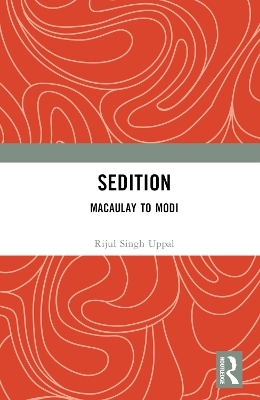
Sedition
Routledge (Verlag)
978-1-032-76894-6 (ISBN)
The liberal use of the sedition law in recent years, mainly by state governments intolerant of dissenting opinion, has provoked justified controversy. After some prominent individuals fell afoul of the law, activists, journalists, lawyers, and jurists took up cudgels on behalf of the victims, and demanded that the law be scrapped, as it belongs to the colonial era. The Supreme Court of India, in May 2022, admitted a host of petitions challenging the law as upheld in Kedar Nath Singh vs Union of India, 1961.
The author believes that the fundamental right to free speech is a non-negotiable right in a democratic country, but the law is relevant for countering threats to national security and sovereignty. Examining the trajectory of the sedition law from its introduction by the British colonial power and its subsequent rejection by the Constituent Assembly of India, the author observes that the statute had to be hastily restored by the Provisional Parliament to cope with the challenges posed by communal rioting in many parts of the country, several years after independence. As such, it is pertinent in times of crisis. The current law undeniably needs safeguards against political misuse, but deserves a place on the statute.
Print edition not for sale in South Asia (India, Sri Lanka, Nepal, Bangladesh, Pakistan and Bhutan)
Rijul Singh Uppal is an advocate practicing at the Courts and Tribunals in New Delhi. He did his Master (LL.M.) in Transnational Crime and Justice from UNICRI, Turin, in partnership with UN mandated University of Peace (UPEACE), Costa Rica. The present work is the fruit of a deep interest in constitutional issues that impact contemporary politics and public life.
Preface
1. Introduction
2. Sedition in Colonial India
3. The First Amendment
4. Need for Sedition Law
Postscript
Annexure I
Annexure II
Annexure III
Annexure IV
Annexure V
Annexure VI
Annexure VII
Annexure VIII
Annexure IX
Annexure X
Annexure XI
Annexure XII
Annexure XIII
Annexure XIV
Annexure XV
Annexure XVI
Annexure XVII
| Erscheinungsdatum | 26.04.2024 |
|---|---|
| Verlagsort | London |
| Sprache | englisch |
| Maße | 152 x 229 mm |
| Gewicht | 453 g |
| Themenwelt | Geisteswissenschaften ► Geschichte ► Regional- / Ländergeschichte |
| Geschichte ► Teilgebiete der Geschichte ► Militärgeschichte | |
| Recht / Steuern ► EU / Internationales Recht | |
| Recht / Steuern ► Rechtsgeschichte | |
| Recht / Steuern ► Strafrecht ► Besonderes Strafrecht | |
| Sozialwissenschaften ► Politik / Verwaltung | |
| Sozialwissenschaften ► Soziologie ► Spezielle Soziologien | |
| ISBN-10 | 1-032-76894-0 / 1032768940 |
| ISBN-13 | 978-1-032-76894-6 / 9781032768946 |
| Zustand | Neuware |
| Informationen gemäß Produktsicherheitsverordnung (GPSR) | |
| Haben Sie eine Frage zum Produkt? |
aus dem Bereich


